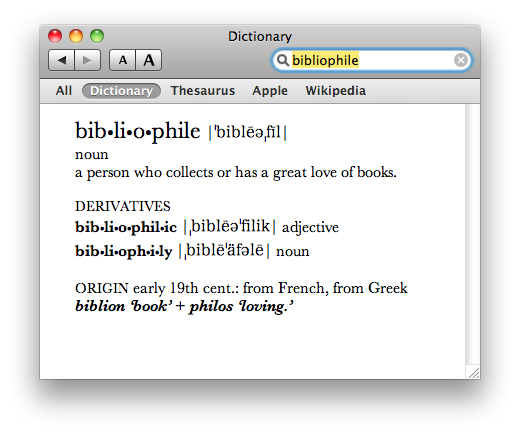Is It Time to Sell My (Dead-Tree Format) Books?
 Wednesday, March 31, 2010 at 11:09AM
Wednesday, March 31, 2010 at 11:09AM  I realized something in the last few days. As I've acquired digital copies of books in software like Accordance, WORDsearch, and Logos, I rarely pick up hard copy equivalents anymore if I have them on the shelf.
I realized something in the last few days. As I've acquired digital copies of books in software like Accordance, WORDsearch, and Logos, I rarely pick up hard copy equivalents anymore if I have them on the shelf.
As these programs transition to devices such as the iPad, their functionality as replacement engines for physical books increases. Even a product like Olive Tree's Bible Reader—the clear superior product of its type on the iPhone—stands to take on whole new significance on the iPad.
Kathy and I have an entire room in our house that holds a personal library of somewhere over 2500 volumes. But I've got at least that many books on the MacBook Pro from which I'm writing this right now. Probably more. And my MacBook Pro weighs a lot less and takes up much less space!
My neglect of the physical wasn't always this way. I used to use Accordance to find an article in the Anchor Bible Dictionary and then I'd oven pull the book off the shelf to read it—especially if it was a longer article. But I just don't do that anymore. It's simply more convenient to read it in Accordance.
And as I look around, I've got a lot of significant duplication: the already mentioned six volume Anchor (Yale) Bible Dictionary, the 10 volume Theological Dictionary of the New Testament, Colin Brown's four volume New International Dictionary of New Testament Theology, Willem VanGemeren's five volume New International Dictionary of Old Testament Theology and Exegesis, 50 or so volumes of the Word Biblical Commentary as well as hundreds of other commentaries, the entire Encyclopedia Britannica, scores of individual references such as BDAG and HALOT, hundreds of theological journals (yes, I even have duplicates of these) and so much more.
I don't know for certain, but I bet that I could eliminate at least a third of my physical library that duplicates electronic texts I have, allowing us perhaps to throw a pullout futon bed in there and create a guest room! Of course, having fought (and mostly lost) the battle with being a bit of a bibliophile, such parting is no easy task. I like my (physical) books! I like the look of a room with multiple floor-to-ceiling bookcases. I can fool guests into thinking I'm much smarter than I actually am. And although I increasingly find digital books more useful, I often still more easily "bond" with physical books. True bibliophiles will understand. But maybe this is just emotional sentimentality.
Of course, having fought (and mostly lost) the battle with being a bit of a bibliophile, such parting is no easy task. I like my (physical) books! I like the look of a room with multiple floor-to-ceiling bookcases. I can fool guests into thinking I'm much smarter than I actually am. And although I increasingly find digital books more useful, I often still more easily "bond" with physical books. True bibliophiles will understand. But maybe this is just emotional sentimentality.
The key factor in my decision rests in the fact that, as I've already mentioned, I've found I simply don't use the physical copies once I have electronic duplicates. And to hold on to things I don't use or need makes me a hoarder and a glutton of things.
There's always the risk that in 20 years, I might not be able to access my books if they are in an abandoned digital format. Physical books generally outlive the original owner. But I'm going to bet against such pessimism. There's comfort in numbers, and the fact that vast numbers of the population are moving to digital books makes me feel somewhat safe that they'll still be around in the future.
In the meantime, even selling the books at a significant discount, I think I can make a pretty decent amount of money on them. I imagine I'll probably list most of the books on Amazon, although I might sell a few combined sets like the NIDNTT & NIDOTTE on eBay. Because of shipping, Craig's List would be a good place for my entire Encyclopedia Britannica. Generally, encyclopedias don't have a great resale value, so I may have to see what kind of "best offer" I can get. Regardless, I'm not using them, and they take up a lot of space.
What about you? Have you sold large quantities of physical books because you had them duplicated on your computer? How did you sell them? What worked best? Please leave your thoughts in the comments.
 Accordance,
Accordance,  Logos,
Logos,  OliveTree,
OliveTree,  WordSEARCH,
WordSEARCH,  iPad in
iPad in  Books & Literature,
Books & Literature,  Personal,
Personal,  Technology
Technology 

